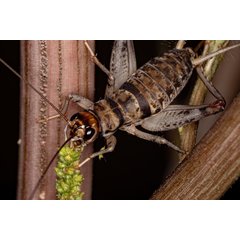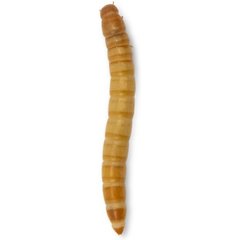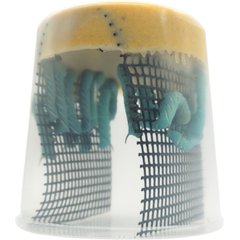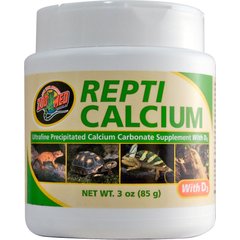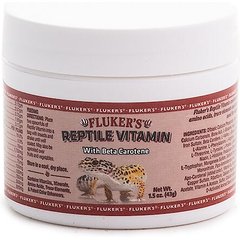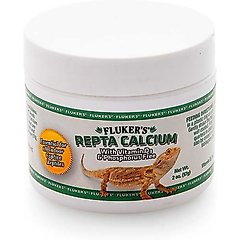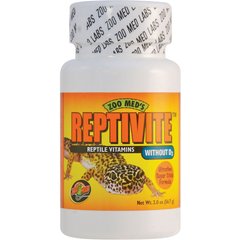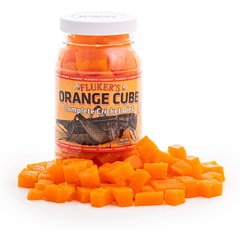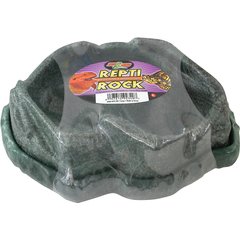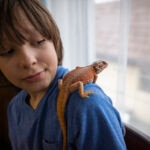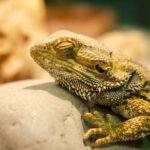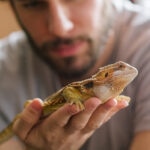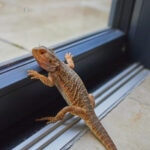What Do Bearded Dragons Eat?
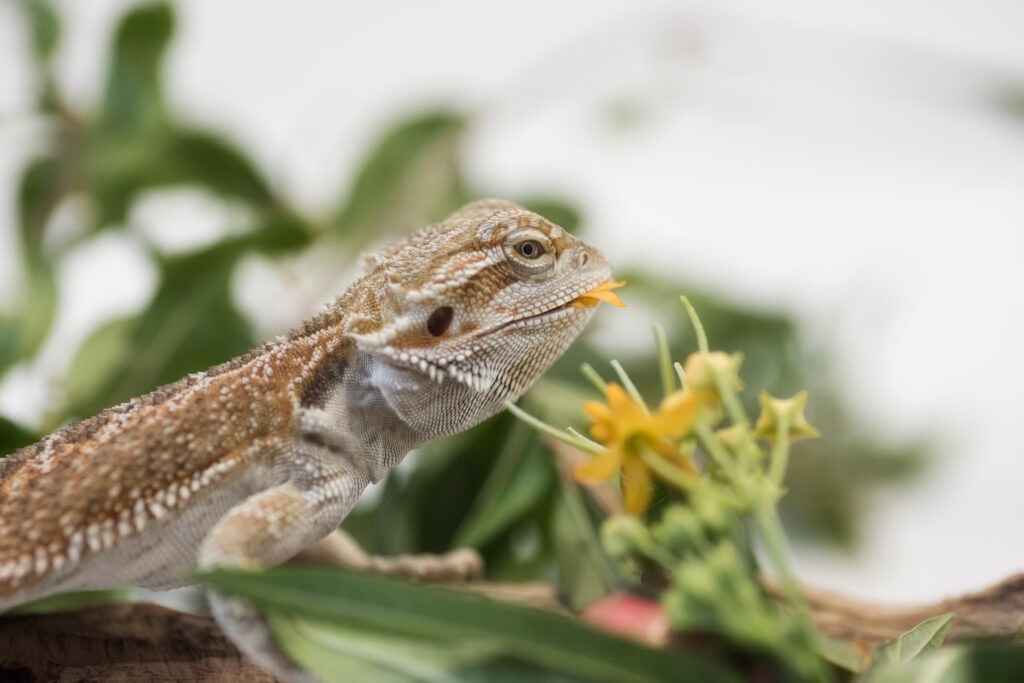
Photo by JeannetteKatzir/iStock/Getty Images Plus
Bearded dragons have quickly become one of the most popular reptile companions for reptile owners. With their calm temperaments, quirky “beard puffing,” and fun personalities, it’s easy to see why. But keeping your dragon happy and healthy starts with one of the most important care essentials: diet.
So what do bearded dragons eat? The answer is more than just crickets or lettuce. These fascinating lizards need a variety of foods at different life stages to grow strong, stay active, and live a long, healthy life.
Key Takeaways
- Baby bearded dragons need insect-heavy meals for growth, while adults thrive on a mostly plant-based diet with fewer bugs.
- Staple foods include gut-loaded insects, leafy greens like collards and mustard greens, safe veggies, and occasional fruits.
- Calcium with vitamin D3, as well as a multivitamin once or twice a week, will ensure they get all their nutrients.
- Don’t overfeed insects, and make sure the insects are no wider than the space between their eyes.
Understanding a Bearded Dragon’s Diet
In their native habitat of the arid woodlands and deserts of Australia, bearded dragons eat a wide variety of foods depending on availability and season. They are opportunistic feeders, which means they’ll consume whatever is safe and nutritious in their environment.
- Insects and small prey: Wild dragons eat crickets, beetles, caterpillars, and other insects they can catch. Occasionally, they may even eat small lizards or rodents.
- Plant matter: Leaves, flowers, and grasses make up an important part of their daily intake, especially for adults. They’ll graze on available vegetation to stay nourished and hydrated.
- Fruits and flowers: When in season, they’ll snack on berries, blossoms, and other soft plant matter. These foods provide natural sugars and moisture.
While pet dragons don’t need to hunt, their diet should mimic the balance and diversity they’d find in the wild.
What Do Bearded Dragons Eat as Pets?
Bearded dragons are omnivores, which means they eat both plants and protein-rich insects. But their balance of foods changes as they grow:
- Juveniles (under 12 months): Young beardies need a protein-heavy diet to support rapid growth. Think lots of insects with a side of veggies. Calcium is critical for growing bearded dragons; be sure to dust live feed with calcium powder and gut-load all insects.
- Adults (18+ months): Shift to mostly plant-based meals, with fewer insects for balance.
A good rule of thumb is more bugs for babies, more greens for grown-ups.
Insects and Animal Protein for Bearded Dragons
Insects are a staple part of a healthy bearded dragon food plan, especially for young dragons who are growing fast.
- Staple insects: Crickets, dubia roaches, and black soldier fly larvae are nutritious, easy to digest, and great for everyday feeding.
Recommended Products
- Occasional treats: Hornworms, superworms, and waxworms are tasty but high in fat. Think of these as dessert items—occasional, not daily.
Recommended Products
Bearded Dragon Supplements
Calcium, vitamin D3 powders, and reptile multivitamins are essential for bone health and overall wellness. Vitamin D3 is especially important for the prevention of metabolic bone disease (MBD). Depending on your beardie’s UVB intake from lighting (which helps them produce vitamin D3), a vitamin supplement without D3 may also be used.
Recommended Products
You can also gut-load live insects before feeding by giving them nutritious greens. This ensures your bearded dragon receives extra vitamins and minerals when eating the insects. Always dust insects and vegetables with calcium and vitamin powders,as directed by your veterinarian, to help prevent nutrient deficiencies.
Quick Gut-Loading Guide for Feeder Insects
- Choose your feeder insects. Crickets, dubia roaches, and black soldier fly larvae are the best staples for gut-loading.
- Set up a clean container. Keep insects in a well-ventilated container with egg cartons or tubes for hiding.
- Add nutritious foods, such as:
-
- Leafy greens: collard, mustard, or turnip greens
- Veggies: squash, carrots, sweet potato
- Commercial gut-loading diets (optional but effective)
-
- Hydrate safely. Use insect-safe water gels or small pieces of fresh produce. Avoid open dishes of water.
- Feed for 12–24 hours. Give the insects enough time to fill up on healthy foods before offering them to your dragon.
- Dust before feeding. Once gut-loaded, coat the insects lightly with calcium or vitamin powder before serving.
What Veggies Can Bearded Dragons Eat?
As your bearded dragon grows, vegetables and leafy greens become the foundation of their diet. Variety is key!
- Everyday leafy greens: Collard greens, mustard greens, turnip greens, and dandelion greens are calcium-rich staples.
- Other safe veggies: Squash, bell peppers, and carrots add vitamins, fiber, and color to meals.
- Avoid certain foods: Spinach (blocks calcium absorption), iceberg lettuce (mostly water, little nutrition), avocados (toxic), and onions are off the menu.
Chop veggies into small, bite-size pieces to make them easier for your dragon to eat.
What Fruits Can Bearded Dragons Eat?
Fruits are like candy for bearded dragons—they’re sweet, tasty, and best enjoyed in moderation.
Safe fruits include:
- Blueberries
- Strawberries
- Mango
- Papaya
- Apples (peeled and sliced)
Offer fruit once or twice a week as a fun, colorful treat. However, feeding too much fruit can cause diarrhea, dehydration, or digestive upset from acidic fruits like citrus. A diet too high in fruit may also lead to calcium deficiency and the development of metabolic bone disease.
Recommended Product
What About Bearded Dragon Hydration?
While bearded dragons get some hydration from their food, they still need other water sources and key supplements.
Provide a shallow water dish, mist their greens, or offer warm baths to encourage drinking.
Recommended Product
Bearded dragons use bowls to drink, but they also soak themselves during shedding to help the process along. During this time, you can also bathe their bearded dragons in a larger container, depending on your pet’s needs.
Bearded Dragon Feeding Schedule and Portions
Feeding frequency depends on your dragon’s age. Here’s a quick breakdown:
- Baby (0–6 months): 70% insects, 30% greens. Feed insects two to three times daily.
- Juvenile (6–12 months): 50% insects, 50% greens. Feed twice daily.
- Adult (12+ months): 20% insects, 80% greens. Offer food once daily, with insects just two to three times per week.
Remove uneaten insects after feeding time so they don’t bite or stress your dragon.
While adult bearded dragons can go several days without eating, always investigate if they refuse food. Double-check their environment, including tank temperature and lighting, to make sure all is in order and your beardie isn’t missing out on any important care. Additionally, ensure there are no stressors like other pets in their space, or any underlying illnesses.
Picky bearded dragons may need more variety in their diet, such as different insects or veggies to eat every day. It’s always good to have several options on hand.
If your beardie still refuses food after checking their environment and offering various foods, bring them to a veterinarian as soon as possible.
Common Feeding Mistakes To Avoid
Even seasoned reptile parents can make mistakes. Keep an eye out for these common pitfalls:
- Overfeeding insects or fruits: Too many bugs can lead to obesity in adults, while too much fruit can upset digestion.
- Feeding poor-quality insects: Do NOT feed wild-caught insects. Focus on crickets and dubias as staples. Mealworms, hornworms and superworms should be treats.
- Skipping supplements: Without calcium and vitamins, dragons risk metabolic bone disease and other serious issues.
So what can bearded dragons eat? The answer is a mix of nutritious insects, leafy greens, fresh veggies, and the occasional fruit treat—backed by proper hydration and supplements. A healthy bearded dragon diet isn’t complicated, but it does take balance and variety.
By paying attention to your dragon’s age, feeding schedule, and food quality, you’ll give them the fuel they need for a happy, active life.
FAQs About Bearded Dragon Food
What are the best greens for bearded dragons to eat?
Collard greens, mustard greens, turnip greens, and dandelion greens provide the best daily nutrition.
What can bearded dragons not eat?
Avoid feeding avocado, spinach, iceberg lettuce, onions, garlic, rhubarb, and any wild-caught insects. These foods can be toxic or cause serious health problems.
How often should I feed a bearded dragon?
Juveniles should be fed insects two times per day, while adults should be fed once daily with mostly greens and insects only two to three times per week.
Attributions
This article was created with assistance from AI tools. The content has been reviewed for accuracy and edited by a human.
